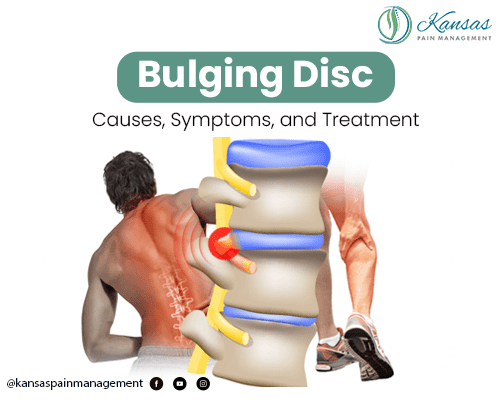A bulging disc, also known as a herniated disc or slipped disc, refers to a condition where one of the rubbery discs cushioning the vertebrae in our spine protrudes or bulges beyond its usual position. These intervertebral discs act as shock absorbers, providing flexibility and stability to the spine. When a disc bulges, it can exert pressure on nearby nerves, resulting in pain, weakness, and other symptoms. In this article, we will discuss about bulging disc and its causes, symptoms, and treatment.
Causes of Bulging Discs
Several factors can contribute to the development of a bulging disc. Some common causes include:
- Age-related Degeneration: As we grow older, the discs in our spine naturally lose water content and become less flexible, making them more susceptible to damage and bulging.
- Spinal Trauma: Accidents, falls, or sudden impacts can cause the discs to herniate or bulge, leading to immediate or delayed symptoms.
- Poor Posture and Body Mechanics: Maintaining poor posture over extended periods, such as sitting or standing incorrectly, can gradually put excessive strain on the spine, increasing the risk of disc bulging.
- Repetitive Strain: Engaging in repetitive activities or motions, especially with poor form or ergonomics, can lead to disc degeneration and bulging over time.
- Genetic Factors: Certain individuals may inherit a predisposition to developing bulging discs, making them more vulnerable to the condition.
Symptoms of Bulging Discs
The symptoms of a bulging disc can vary depending on the location and severity of the condition. Common signs include:
- Back or Neck Pain: A persistent, dull ache or sharp pain in the affected area is a typical symptom. The pain may worsen with movement, lifting, or prolonged sitting or standing.
- Radiating Pain: If the bulging disc compresses a spinal nerve, it can cause pain that radiates along the nerve pathway. For instance, a bulging disc in the lower back may lead to sciatica, characterized by pain, numbness, or tingling sensations that extend down the leg.
- Muscle Weakness and Numbness: Nerve compression can result in muscle weakness, making it challenging to perform certain movements. Additionally, numbness or tingling sensations may be experienced in the affected area or along the nerve pathway.
- Changes in Reflexes: In some cases, a bulging disc can affect reflexes, causing them to be diminished or exaggerated.
Treatment Options for Bulging Discs
- Rest and Activity Modification: Taking a break from activities that exacerbate symptoms and adopting proper body mechanics can provide relief and aid in the healing process.
- Physical Therapy: Targeted exercises and stretches prescribed by a physical therapist can help alleviate pain, improve flexibility, and strengthen the surrounding muscles, providing better support to the spine.
- Pain Management: Over-the-counter nonsteroidal anti-inflammatory drugs (NSAIDs) or prescribed pain medications can help manage pain and reduce inflammation associated with a bulging disc.
- Epidural Steroid Injections: In some cases, corticosteroid injections may be administered directly into the affected area to reduce inflammation and alleviate pain.
- Surgical Intervention: Surgery is typically considered a last resort if conservative measures fail to relieve symptoms. Procedures such as discectomy or spinal fusion may be performed to remove the bulging portion of the disc or stabilize the spine.
Conclusion:
A bulging disc can be a source of significant discomfort and pain, affecting one’s quality of life. However, with proper understanding, early diagnosis, and appropriate treatment, individuals can find relief and manage the condition effectively. By maintaining good posture, practicing body mechanics, and engaging in regular exercise, we can promote spinal health and minimize the risk of developing bulging discs. If you experience persistent back or neck pain or any associated symptoms, it is advisable to consult with your provider for an accurate diagnosis and personalised treatment plan.
Read Our Article: All You Need To Know About Spinal Stenosis

